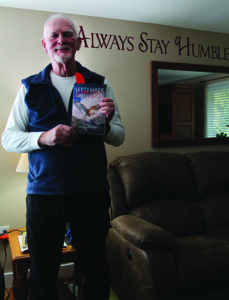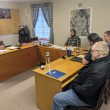By Sarah Brown
Lebanon Local
As an adolescent, Tom Peters was pretty certain about what he wanted to do with his life: marry an Indian [sic] princess, build a log cabin in “the wilds” of Canada, and live happily ever after.
Influenced by books by Jack London – e.g., “Call of the Wild” and “White Fang” – and books about the Klondike and love of the outdoors, Peters envisioned a life of his own that would read like the novels he grew up on.
Though his dreams never materialized, what he got in return was a chance to publish his own novel about Santiam Kalapuyas, a modern day romance and terrorism located in the fictional town of Falon, just outside Lebanon.
His book, “September Winds,” follows Sam McKenzie, the last full-blooded Kalapuya who is very involved in the timber ridge industry. Published by Page Publishing, it can be found at Think Brain Candy Bookstore, and on Amazon.com.
Peters grew up in Wisconsin, and raised his own family there on an 87-acre “hobby” farm.
“(There was) a little river running through the back of it, and dogs and kittens and goats and chickens and rabbits and everything for those kids, and a pony named Brownie, and a couple horses,” he said.
He shared with his kids what he learned in a book by Euell Gibbons, “Stalking the Wild Asparagus,” about the edible foods that grow wild, such as dandelions and cattails.
“I got into that stuff with my kids, not because we needed the food, but because these three little rascals and I had so much fun finding and gathering and doing that stuff together.”
An important part of his own book includes camas, the bulb of a flower used by the Santiam Indian tribes to produce food and trading goods, he said.
Peters moved to Oregon in 1980, following up on a promise he’d made himself after taking a business trip to Portland.
“I saw the Coast Range mountains, I saw a little bit of the Cascades and the incredible timber country. I’ve always been an outdoor enthusiast, and I fell in love with the area.”
He got into the grass seed business and bought 13 acres in Lacomb, where “September Winds” was born and where, Peters might admit, the town of Falon resides.
Conception of the story began after Peters had bulldozed a few walking trails on his land.
“On the right side of the fence line was a knoll, or little hill, and after the first rains I was walking my golden retriever and I found some arrowheads. I picked them up and I thought to myself, ‘Gosh, how long ago did someone shoot these things, and at what, and for the first time in hundreds or thousands of years, I made contact?’”
He’d known about the Kalapuyas, but found that very little had been written about them,

Photo by Sarah Brown
he said. After years of thorough research and writing and re-writing the story, which includes detailed historical information about the tribes, Peters presented his first chapter to his writers network group.
Peters had started Chapter 1 about Lewis and Clark in his original text, but a member in the writers group suggested he change the chapter to capture the reader’s attention right off the bat, he said. So he did just that, and believes it made all the difference.
Now, Peters asks for a promise from potential readers: to read at least the first chapter.
“People who are reading the book now said that first chapter got them, and they couldn’t put the book down after that,” he said.
The story is woven with the symbolism of a red feather, the meaning of the book’s title, and a line from Chief Seattle’s “heart-wrenching” speech to Congress, Peters said. With his debut novel complete, he is now a few chapters deep into writing a follow-up story.
What Peters appreciates about the Kalapuya tribes was their peaceful lifestyle, how they lived a structured, ethical and moral life, and how they passed down their history through stories rather than through a written language, he said.
“They believed in the spirit of the human being. They believed in the spirit of the sun and the moon, of the animals – they all had spirits and they revered all of them and respected all of them,” he said. “It was amazing that with no written language, how they were so structured. It was such a beautiful thing.”
Peters has been writing his whole life, though none of his other works have been published.
“It’s been mostly limericks and rhymes, funny little things. I wrote a little novellette called ‘The Tree Walkers.’ It was about the life of trees, and if you abuse trees, what they can do to you, to little boys who are snotty and naughty about chopping down little trees.”
He also wrote children’s stories, including “The Bully Bullfrog,” about a bullfrog who moved into the puddle pond and started bullying the minnows and snails and turtles who never got along until the bullfrog showed up.
Today, Peters lives in Lebanon and continues to run his business, Snow Peak Seed, out of Lacomb. He is a past exalted ruler at the Elks Club, and serves as a Strawberrian.
“This is a beautiful place to live. How can you not love the mountains, the high desert, the ocean, and it’s all within a two hour drive? I’m in love with this valley and Oregon.”





